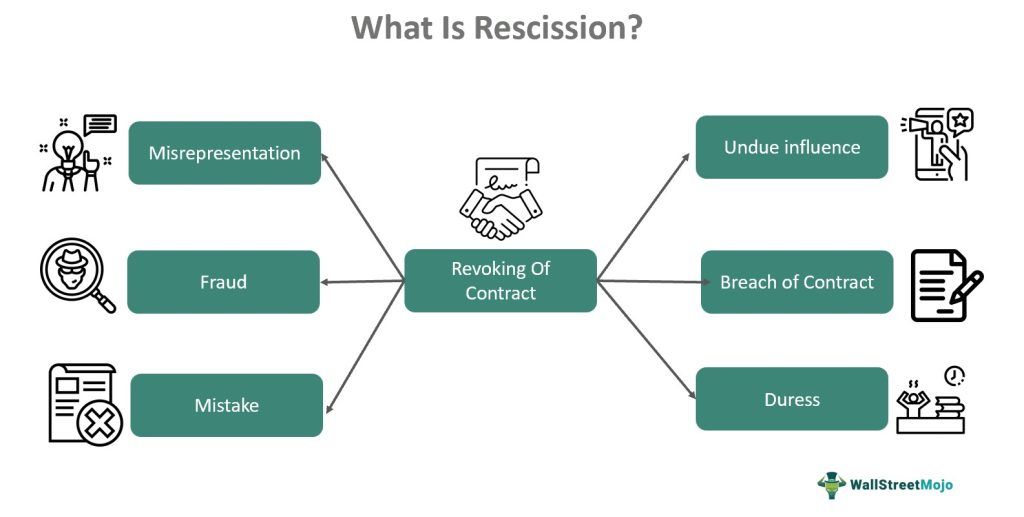Table Of Contents
Rescission Meaning
Rescission refers to the act of canceling, revoking, or annulling a legal contract or agreement. It is a legal remedy that allows a party to a contract to undo the transaction and return to the state of things before the agreement was made. It occurs due to various reasons, such as fraud, misrepresentation, mistake, duress, undue influence, or breach of contract.

It allows parties to a contract to undo an agreement that was made under unfair or unlawful circumstances. The ability to rescind a contract helps to ensure that the parties are treated fairly and that the agreement reflects their true intentions. In some cases, rescission may be requested as an alternative to seeking damages or other remedies.
Key Takeaways
- Rescission is a legal term that refers to the cancellation or voiding of a contract. Rescission may occur due to some legal defect or irregularity in the formation or execution of the contract.
- The primary purpose of rescission is to provide a fair and equitable solution when a contract is induced by fraud, mistake, or undue influence.
- There are two types of rescission: unilateral rescission and mutual rescission.
- Rescission is typically used to address issues with the formation of a contract, while termination is used to address issues with the performance of a contract.
Rescission Of Contract Explained
Rescission of a contract occurs when one party requests that the contract be canceled or annulled due to some legal defect or irregularity. The requesting party must show that there was some mistake, misrepresentation, fraud, duress, undue influence, or other issue that makes the contract invalid or unenforceable.
Suppose the other party agrees to rescind the contract. In that case, the parties can typically work out the details of the cancellation, such as returning any property, money, or assets that were exchanged as part of the agreement. Once the contract is rescinded, the parties will be restored to their original positions as if the agreement never existed.
If the other party refuses to rescind, legal action may be necessary to enforce the contract's rescission. This may involve filing a lawsuit and presenting evidence to support the request to rescind the contract.
Types
There are generally two types of rescission that can occur: unilateral rescission and mutual rescission.
- Unilateral Rescission: Unilateral rescission is when one party cancels a contract without the other party's consent. In specific cases, rescission can be sought if the contract is breached or voidable due to fraud or misrepresentation.
- Mutual Rescission: Mutual rescission occurs when both parties to the contract agree to cancel or rescind the contract. This rescission is used when parties agree the contract is no longer beneficial or possible.
Examples
Let us look at the rescission examples to understand the concept better:
Example #1
Suppose Jade wants to buy a used car from Jane. They agree on a price of $5,000 and sign a contract for the sale. After the test drive, Jade discovered major mechanical issues with the car. Feeling misled and taken advantage of, Jade decides to rescind the contract. He sends a letter to Jane stating that he wishes to cancel the contract and return the car. He also demands that Jane return his $5,000 payment.
Jane refuses to rescind the contract, citing Jade's inspection opportunity and the binding nature of the contract. However, Jade presents evidence that Jane intentionally concealed the mechanical problems and misrepresented the condition of the car. As a result, Jane eventually agrees to rescind the contract and return Jade's money. They finalize the cancellation details, arrange car returns, and restore both parties to their pre-contract positions.
Example #2
On March 8, 2024, the Delaware Court of Chancery annulled Elon Musk's $55.8 billion, ten-year equity compensation package, finding that Tesla's directors had violated their fiduciary duty by approving such a substantial compensation package. Based on a proxy statement given to stockholders, the company decided that the document omitted important information regarding Musk's control over the process of deciding on the compensation package and misrepresented some board members as independent. The ruling underscores the importance of following and documenting the executive compensation approval process, offering crucial guidance for boards and compensation committees.
Rescission vs Termination vs Repudiation
The primary differences between the three concepts are as follows:
| Rescission | Termination | Repudiation |
|---|---|---|
| It refers to the cancellation or voiding of a contract due to some defect or irregularity in its formation or execution. It is a remedy that is typically available when a contract is induced by fraud, duress, mistake, or other factors that make the contract unenforceable. | Termination, on the other hand, refers to the ending of a contract by mutual agreement of the parties or due to a breach of contract by one of the parties. It may be done with or without cause and usually involves specific terms, procedures, and consequences that were agreed upon in the original. | Repudiation refers to the renunciation or rejection of a contract by one of the parties, typically by stating that they will not fulfill their obligations under the contract. |
| It voids a contract due to some defect or irregularity in its formation or execution. | Termination ends a contract by mutual agreement or due to a breach of contract. | Repudiation can occur when one party breaches the contract or if they no longer wish to perform under the agreement. |
